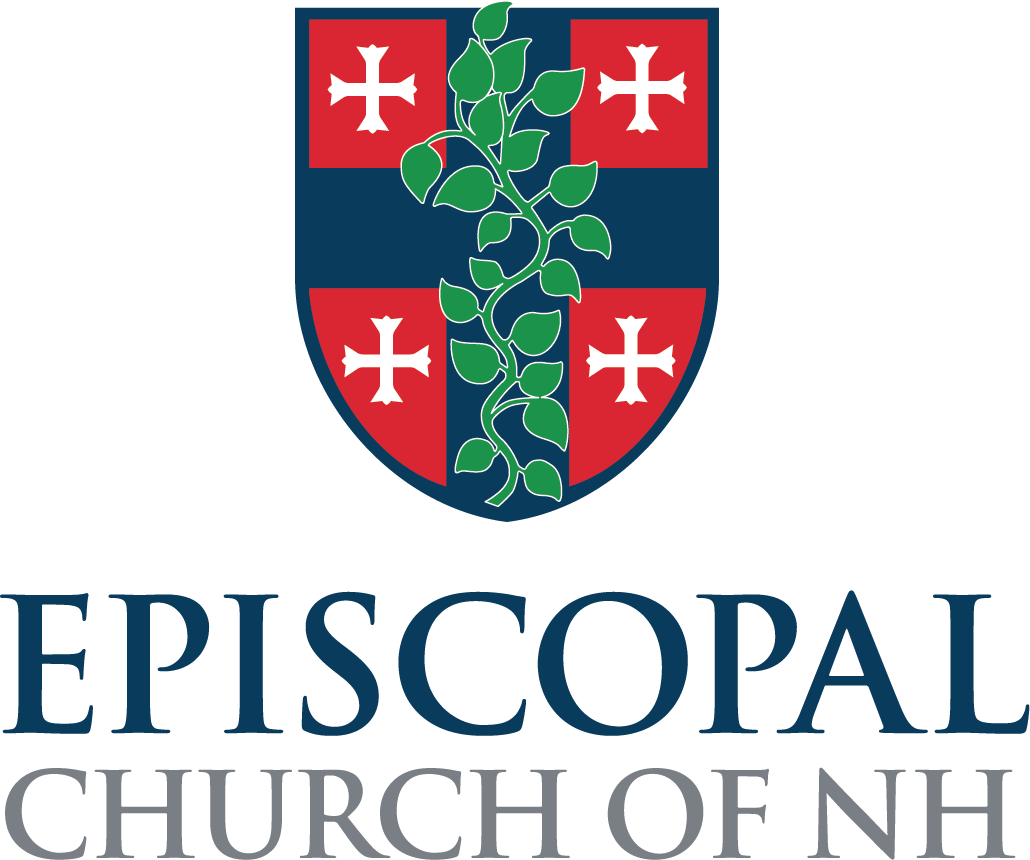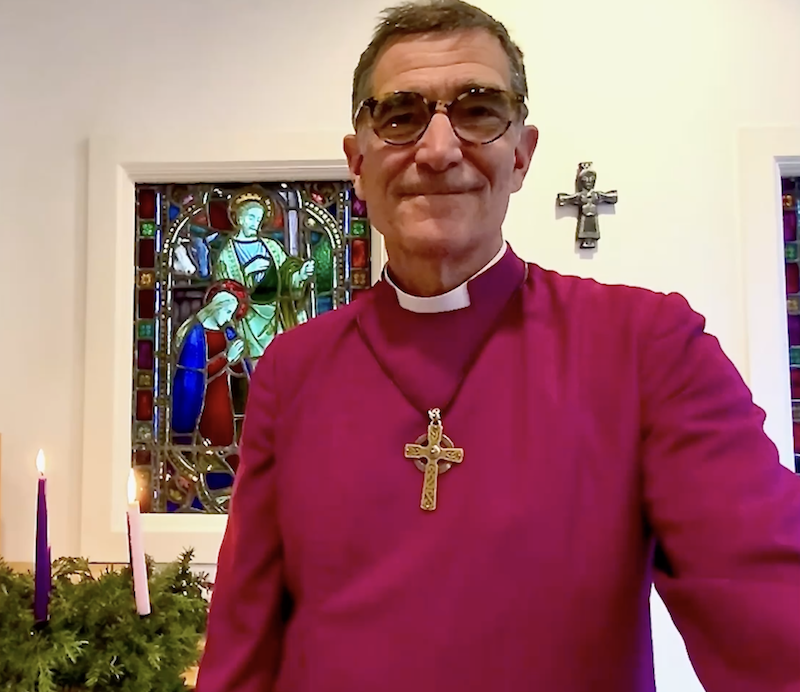Let me begin by telling a brief story about an exchange I had about 20 years ago. Whenever I remember this embarrassing dialogue, it seems to me that God is still working on me, still inviting me into a deeper conversation with Christ. I’ve shared this story with a congregation or two over the past years, so I ask your forbearance if you’re hearing this for a second time, or more.
Once I was invited to meet a bishop to explore the possibility of being called to a new parish in another diocese. Of course, I thought I had a lot to offer-- all the credentials that would make a young enthusiastic priest very attractive to be invited to take on a new challenge. I put on my best suit and starched collar and visited this bishop in his office. I thought we would just get to the business of a job interview—you know—here’s an opening, these are the skills and experience needed, what do you have to match them? But once we sat down, the bishop immediately, without the cushion of any small talk, asked me: So, Rob, what is the Good News for you?
Had I been standing and not sitting, I would have felt my knees buckle. I felt stumped.
I did not have an answer.
Now this was not like an ecclesiastical game show where he was intentionally trying to stump the chump in the suit. He was sincere. He may have been asking for me to share some good news for him because within months he would surprisingly be diagnosed with a terminal illness and die. He may have been eager that morning to hear a young priest share the good news of God becoming human, taking on our condition, emptying himself by becoming weak, imperfect in the flesh, vulnerable to human cruelty, injustice, even death, and then rises to destroy death itself. Years later, when I shared that story with his widow, she told me, “You know, he just wanted to hear someone say something as simple and clear and strong as, “Jesus loves me. This I know because the Bible tells me so.”
I share this with you because it seems to me that the whole church itself is in that bishop’s office. We might be expecting smooth sailing, easy questions to be answered with coffee hour lightness and ease. Instead, we are facing some dire realities to which our God is calling us to some clear, convincing, and bold responses that reflect the unshakeable faith and hope that is in us.
Do we in the Episcopal Church of New Hampshire, feel stumped, speechless, or find ourselves faltering when we are asked, what is the Good News for you?
I think that question is both disruptive and divine. Leading us to reclaim the fervor of our beliefs in these times.
What is the Good News in the times when weather patterns are more fierce and damaging? We experienced the hottest summer on record this year. We are already seeing an increase numbers of what are called “climate refugees”. This is a result, in large part, of a broken relationship with creation. When we see God’s creation as our own, and not God’s, we presume we can have our way with it, extract its resources and exude waste without consequence. God calls us to reject domination over creation and learn a way of being in harmony and right relationship with every creature of our environment as a way of honoring and showing gratitude to our Creator.
What is the good news in this for us? And how are we being called to turn?
These and other trends and phenomena are being contended and debated in a culture of increasing anger and violent rhetoric. Language that has historically opened the way toward actual bloodshed directed at Blacks, Jews, Muslims, the poor, refugees, homosexuals and transgender persons, and those religious groups that seek to support them. The appearance of Christian Nationalism - the coopting of political and even military force in the name of God - is nothing more than a grotesque parroting of the same religious intolerance, mixed with the means of armed violence, that our world deplores in regimes like the Taliban, Hamas, the Third Reich. And lest we feel immune to those same impulses, here in the United States the early leaders of the Episcopal Church, as far north as Maine, New Hampshire, and Vermont, quoted the Holy Scriptures to defend chattel slavery: the denial of rights of God’s children to take in the pursuit in life, liberty, and pursuit of happiness. Yes, we have some repairing to do that is more than merely signaling our desire to appear virtuous but to employ our resources, financial, personal, and spiritual to good effect.
Church, what is the Good News for us, now, when our political systems and language are so frazzled and fatigued that they seem not to withstand the new expressions of fear and hatred.
In the past 50 years, the experience of the Episcopal Church, along with that of every mainline denomination of the American Church, has been steadily losing membership and attendance on Sunday mornings. This is not new news. The peak of our numbers was in the mid 1960’s when the nation had an explosion of population. The post World War II-Baby Boom led to just about every town, city, church and synagogue to build new schools, hospitals, add wings for Sunday School and sabbath schools. Since then, the birthrate has declined steadily. A kind of secularism has taken hold, a rise in the belief that meaning of life could be bought by consuming and acquiring more. Distrust in institutions followed terrible heartbreaking and egregious breaches in trust in by churches, political parties, and other institutions.
Cultural incentives to keep Sunday morning a time for church-going evaporated. It was rare for any business to be open on a Sunday. Now much of the American workforce works on Sunday.
What is the good news in these trends for us?
The Good News is this: No matter what, no matter when, we get to be the Body of Christ, alive, vibrant, hopeful. And we are! I am firmly convinced that we are exactly where God wants us to be: in need, perplexed, at the foot of the Cross, needing to be shown again the power of God’s life that is beyond the humiliations, rejections, failures, atrocities and brutalities. This is where, again, and again, the church has learned to reinvent and rediscover and reshape itself to be more and more recreated in the image of Christ. Instead of the stark, barren, bloody and horror of the wasteland that humanity insists on settling for, we can be brought to the beauty of a garden restored with life and the promise of a fresh start. That’s the Good News for me. And who preaches that Good News to me? Who gives me the parables and the words and the images that I so often need to keep going?
You do. You preach and show the Gospel to me and to the world.
Every place I go to, there are people, old and young, who are hungry for community. They want to be seen and nourished spiritually by a Church that cares for them, and where they can express and share their own God-given need to pour out their love for God and neighbor.
Everywhere I go, every Sunday morning, whether in the humble mission in Franklin, or in the glorious choir of Portsmouth; in the woods in Canterbury, on the beach in Rye, or under the biomass plant in Berlin, and every weekday worship service and meeting in between, I meet people who want to love... to build not to tear down...to find the face of Jesus in the face of the one who is in need of love, of care, of community.
Unlike my own early faltering in sharing he good news, I have had the experience of young people coming into my office and I can’t get a word in edgewise for their joyful exuberance in sharing with me the Good News of how God has brought them to love God, to seek and follow Jesus, and be guided by the Holy Spirit.
We are seeing more applications to our School for Ministry for priests and lay preachers. eucharistic visitors, eucharistic ministers, and spiritual directors. Last year, our School for Ministry has graduated its first class of persons, Ed Frost, Michael Reinke, and Steve Rugg who are now serving in parishes and in pastoral roles outside of the parish where leadership was sorely needed. This coming Advent, we’ll be ordaining Fred Chisholm, Aaron Jenkyn, to the priesthood and Joe Rose to the diaconate on the way to the priesthood.
It would be hard to imagine three more different disciples, but if you meet them you will see, oh. These persons have been called to give us hope in a wonderfully complex world. There’s something of the Holy Spirit in them that is obviously moving us. And there are more on the way. In a time when the clergy shortage in the Episcopal Church has hit a moment of crisis, we in New Hampshire seem to be where priests from other parts of the wider church look to come, to apply, and even settle. Good News.
There is something in the hopefulness, courage, faithfulness and tenacity of expansive and radically inclusive love that this church, the people of this convention exhibit, that brings people here to serve and grow in love.
Consider Christ Church, Portsmouth who are doing a new and bold thing in redeveloping their property to provide desperately-needed housing and shelter for women and children at risk.And at Epiphany, Newport, serving school children.
There is a strong pulse of love and life that is at heart of this Church.
It’s a heart that breaks when it sees the brutality committed against God’s children and hears of the horrors of war and terrorism among our siblings in the faith of the God of Abraham. And it is a heart that will pour out generously in compassion.
In the midst of such agony, God is raising us. That is good news.
Not all disruption is divine and not everything that is divine disrupts. But here we are, and will always be, God willing, seeking to restore, renew, and repair the bonds of humanity and creation that God longs for us to cherish and live in. Born out of the hateful and bloody conflict of the protestant reformation our Anglican communion choose to say, we will be both, protestant AND catholic and seek a comprehensiveness and compromise.
Tomorrow we will see a brief presentation of what Bishop Mark Beckwith has called the secular version of the Anglican Communion, and it should be no surprise that the deep fierce but hope-filled conversations between red and blue and left and right are taking place in an Episcopal Church...at St. Andrew’s, New London. This is how we are showing our commitment to our baptismal vows to love our neighbor as ourselves and to uphold the dignity of every human being. Good News.
Finally, consider the apostle Paul, writing from prison, what does he say, Woe? Misery? Calamity and disaster?
No. Then he says, and I say the same: a countercultural word of resistance, or resilience, and above all, hope. If it’s the only word you can say if someone asks you, what is the Good News for you, well, you can do much worse: Rejoice. Rejoice. Again I say, Rejoice.

